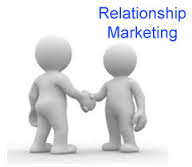Once you have customers you need to keep up the selling process to retain them and grow their business. One of the most effective ways to do this is to focus on the needs of customers through a process that is generally called “relationship marketing”.
The first sale was hard and expensive. You had to advertise to get the customer, get them into a situation where you could sell to them, gain their trust and finally gather enough information to satisfy your marketing needs. Now that that’s behind you it’s time to think about repeat sales, but now you’re working with a customer whom you know and who already knows you.
There are a few “basics” to relationship marketing to the customers you’ve already acquired:
1. Listen to them. In one or more ways they’ll tell you what they want from you and how to keep them satisfied.
2. Survey them to get their feelings and opinions. Get them to share their thoughts with you.
3. Focus on satisfying their needs. Do this and the sales will follow.
4. Get them to help you leverage the relationship by introducing new customers to you on the basis of their satisfactory experience.
5. Honesty is the best — and only, policy. If you can’t help them tell them so, then do all you can to satisfy their needs through other channels.
So why do we say relationship marketing isn’t working? To begin with, consumer surveys generally show that their experience with even highly sophisticated relationship marketing efforts is pretty unexciting. Businesses have spent a lot of money but their customers don’t feel that anything intimate is happening.
Obviously the basic idea is sound. Customers are logically going to appreciate being given more attention than just a sales effort, and companies that work to understand and serve their customers better should logically come out ahead. The problems really lie with what businesses use to reward their customers for their loyalty.
Too many marketers think that keeping in touch with their customers means sending them a steady barrage of marketing messages. Special offers, catalogues, notices of “special customer sales” — these are still just advertisements and who needs more of those? That’s not a meaningful relationship as anyone but a die-hard salesman would define it.
Too much of the success of a company’s relationship marketing is determined by simple numbers. How many customers signed up for the program? How many customers visited our website? All evaluations are based on quantitative rather than qualitative factors.
Instead the business needs to manage its customer relationships with a sense of balance between the company’s needs for sales and the resistance of the customer to being “used”. Trust, created in the initial sale to the customer, now needs to be nurtured and grown — not abused!
This means asking them for information about themselves in such a way that they can see it’s going to lead to your giving them better products and better service. Don’t ask “What can we sell you?”, but rather ask “What would you like us to do for you?” and you’ll see the difference.
Remember that customers don’t want a relationship with any marketer that’s too close. Building a relationship is done over a long period of time with steady and regular efforts on your part. Keep in touch. Be there, but not intrusively so.
David Lavietes, Senior Vice President of Strategic Services at Healthworld Communications Group, sums up the situation as it should be viewed by marketers seeking to benefit from the thoughtful application of relationship management principles:
“Relationship marketing isn’t a tactic. It’s the art of using the appropriate direct response tactics – teleservices, promotions, interactive, – in concert to conduct an ongoing conversation with the brand’s most valuable customers.
Successful relationship marketing, whether to physicians or consumers, requires an underlying infrastructure that informs future communications with the results of previous interactions and a commitment to developing a relationship that will grow over time.
CRM is not a quick fix, nor is it appropriate in all categories; it requires investments of time and money. But, when executed flawlessly, it can produce both brand fanatics and superior ROI efficiency.
Copyright 2005, RAN ONE Inc. All rights reserved. Reprinted with permission from www.ranone.com.

 Chris’ combination of academic credentials, career experience and temperament ideally suit his calling as a business development advisor. Clients say he has a mind for business and a heart for service.
Chris’ combination of academic credentials, career experience and temperament ideally suit his calling as a business development advisor. Clients say he has a mind for business and a heart for service.